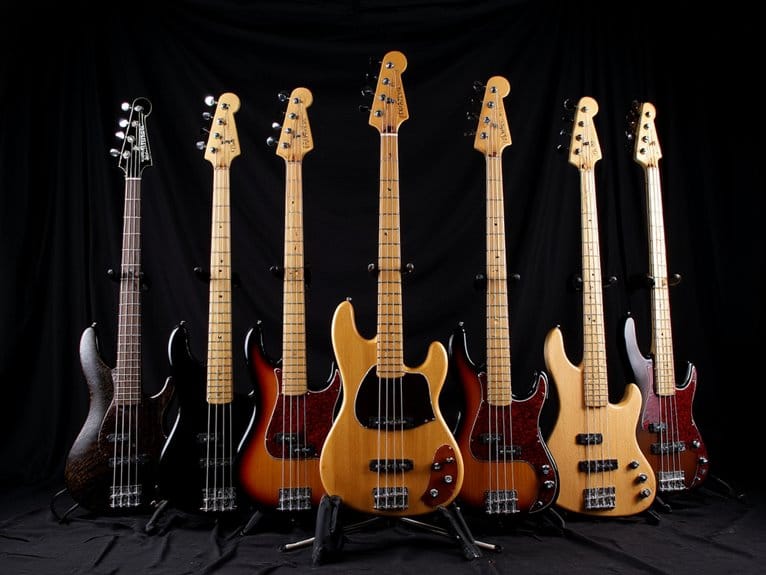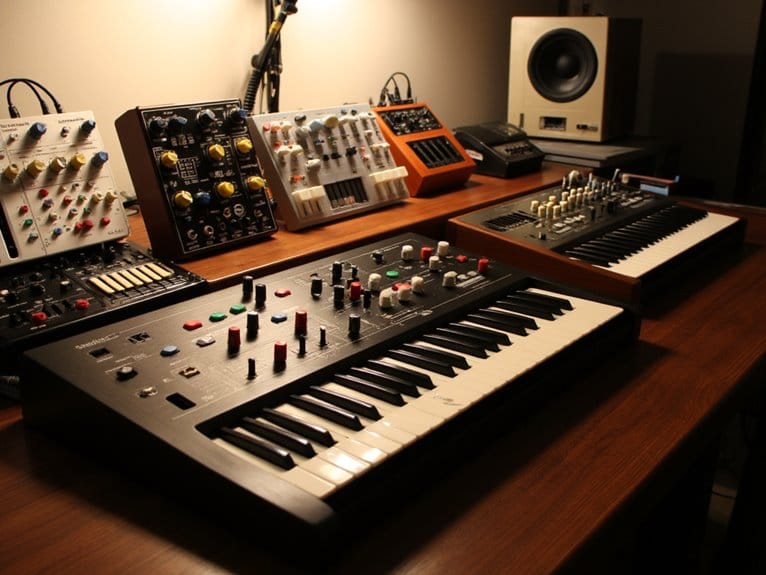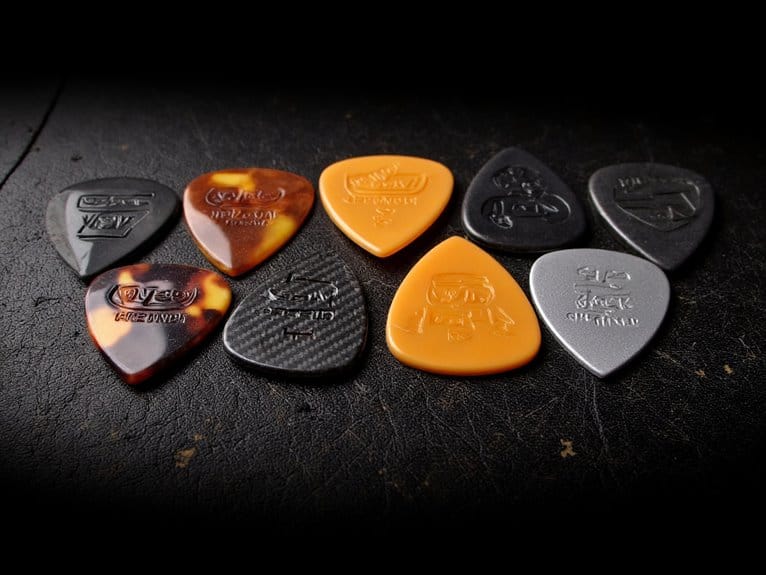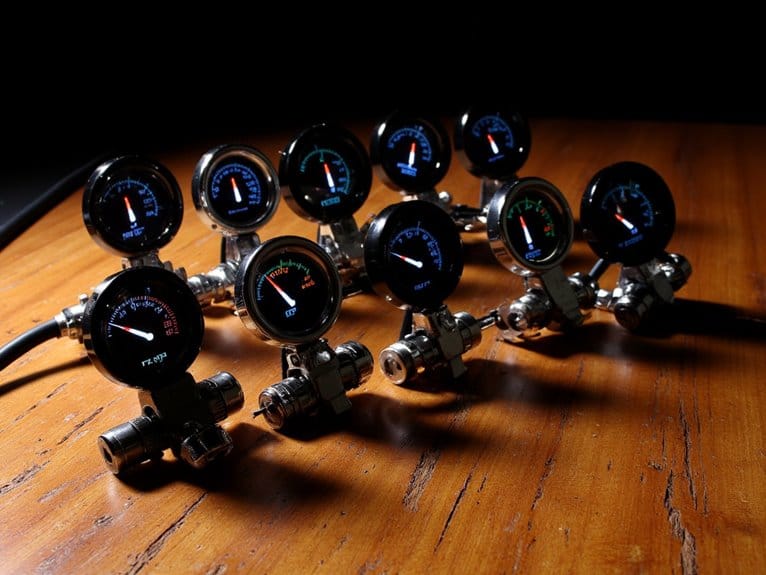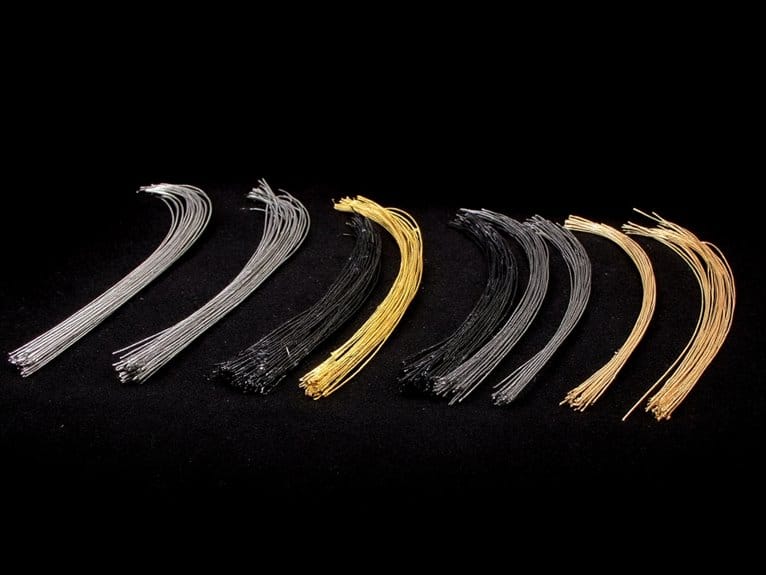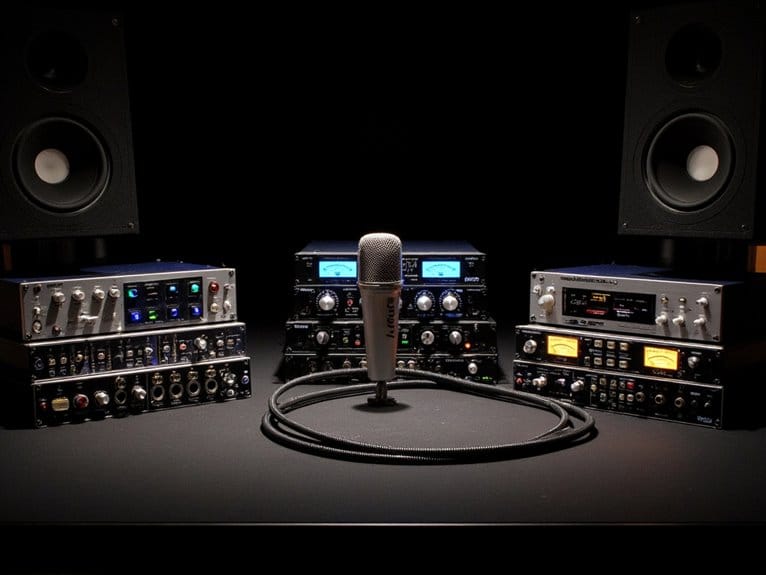Best High-End Bass Guitars That Deliver Professional Sound and Quality
I’ve tested countless high-end bass guitars, and the top performers consistently deliver exceptional craftsmanship through premium materials like Canadian maple necks, compound-radius fretboards, and professional-grade pickup systems. Models like the Jackson JS3 with its graphite-reinforced neck and dual humbuckers, or Fender’s acoustic bass featuring solid spruce tops and Fishman electronics, represent the gold standard for professional sound quality. The key factors I’ve found most critical include body wood selection, pickup configurations, and neck construction quality, which directly impact tonal character, sustain, and long-term stability that serious musicians demand for studio work and live performances.
We are supported by our audience. When you purchase through links on our site, we may earn an affiliate commission, at no extra cost for you. Learn more.
Notable Insights
- Body wood selection like mahogany, ash, and maple directly impacts tonal character, sustain, and overall sound quality in professional bass guitars.
- Pickup configurations including single-coils, humbuckers, and PJ combinations determine sonic versatility and voice characteristics for different musical genres.
- Premium neck construction with graphite reinforcement and quality materials ensures long-term stability and enhanced playability for professional use.
- High-end hardware and electronics influence signal clarity, durability, and noise reduction, essential for professional recording and performance applications.
- Scale length specifications affect string tension, fret spacing, and ergonomic comfort, impacting both playability and tonal response in professional instruments.
Jackson JS Series Concert Bass JS3, Satin Black, Amaranth Fingerboard

When I first encountered the Jackson JS Series Concert Bass JS3 in Satin Black, I realized it’s the perfect gateway instrument for intermediate players who’ve outgrown their starter bass but aren’t ready to drop serious cash on a professional-grade instrument. The poplar body, paired with a maple neck and amaranth fingerboard, delivers surprising tonal depth through dual Jackson humbucking pickups that I’ve found quite responsive across different playing styles. What impressed me most was the 12-16-inch compound radius fretboard, which shifts from rounded near the nut for comfortable rhythm work to flatter positions for smooth lead runs, while graphite reinforcement keeps everything stable during extended sessions.
Best For: Intermediate bassists seeking an affordable upgrade from starter instruments who want professional features like compound radius fretboard and dual humbucking pickups without the premium price tag.
Pros:
- Compound radius fretboard (12-16 inches) provides comfortable rhythm playing near the nut and smooth lead runs on higher frets
- Dual Jackson humbucking pickups deliver responsive tonal depth across different playing styles
- Graphite-reinforced maple neck ensures stability during extended playing sessions
Cons:
- Quality control issues reported by users including high action and setup problems out of the box
- Battery compartment difficulties noted in customer feedback
- Mixed user experiences suggest inconsistent manufacturing standards
STRICH Electric Bass Guitar 4 Strings Full-Size Beginner Kit (SPB-S10 Black)

I’ll be honest-finding a quality bass guitar that doesn’t break the bank while delivering professional-grade construction can feel like searching for a needle in a haystack, but the STRICH Electric Bass Guitar 4 Strings Full-Size Beginner Kit (SPB-S10 Black) manages to bridge that gap with surprising effectiveness. The AAA-grade Canadian maple neck construction, combined with high-quality metal tuners and individually adjustable string heights, creates a surprisingly stable foundation for serious practice sessions. While the included tuner might require upgrading and you’ll need basic setup skills for ideal action adjustment, the complete package delivers genuine value at this price point.
Best For: Beginner to intermediate bass players seeking a complete, affordable starter kit with quality AAA-grade Canadian maple construction and all essential accessories for immediate practice.
Pros:
- High-quality AAA-grade Canadian maple neck and construction materials provide durability and professional-grade stability
- Complete beginner kit includes everything needed to start playing: 2x5w practice amp, gig bag, tuner, strap, cable, and cleaning cloth
- Individually adjustable string heights and high-quality metal tuners offer precise setup control and stable tuning performance
Cons:
- Included tuner has reported quality issues and may require upgrading for reliable use
- Setup adjustments require hex wrench and basic technical skills, which may challenge complete beginners
- Minor buzzing on open E string and strap quality issues may need addressing for optimal performance
Ktaxon 6 String Electric Bass Guitar for Beginners (Upgraded White)

The Ktaxon 6 String Electric Bass Guitar represents an intriguing paradox in today’s instrument market, offering six-string complexity at a beginner-friendly price point that typically accommodates only four-string models. You’ll find this 12.12-pound basswood instrument delivers surprising value through its H-H pickup configuration and three-way selector, though I’d honestly recommend budgeting for electronics upgrades since the stock components generate noticeable noise. The C-shaped maple neck provides comfortable playability across its laurel fretboard, while the complete kit inclusion eliminates additional purchases that typically frustrate beginners. Users consistently praise the solid fretwork and intonation, earning this bass a respectable 4.3-star rating despite requiring modifications for peak performance.
Best For: Beginner bass players who want to explore six-string complexity at an affordable price and don’t mind performing electronics upgrades to optimize performance.
Pros:
- Complete all-in-one kit with bag, strap, cable, and tools eliminates need for additional purchases
- Solid fretwork and intonation with comfortable C-shaped maple neck for easy playability
- H-H pickup configuration with 3-way selector provides versatile tone options across multiple genres
Cons:
- Stock electronics generate noticeable noise and require upgrades for optimal sound quality
- Cheap components like pots and jack may need replacement for better performance
- Risk of component failure when attempting modifications due to basic build quality
Grote GTBS-01 Electric Bass Guitar 4 String (Red)

Musicians seeking exceptional value in their four-string electric bass will find a compelling option in the Grote GTBS-01, which combines premium Canadian maple construction with versatile H-H pickup configuration at an accessible price point. The rosewood fretboard complements the maple neck’s bright tonal characteristics, while the lightweight poplar body delivers warmth without sacrificing comfort during extended playing sessions. At 8.69 pounds, you’ll appreciate how this bass handles everything from rock to jazz without straining your back, and the adjustable bridge guarantees proper intonation across all four strings for studio-quality performance.
Best For: Beginning to intermediate bassists looking for a versatile, lightweight instrument that delivers quality construction and tonal flexibility across multiple musical genres at an affordable price point.
Pros:
- Premium Canadian maple neck and headstock provide excellent tuning stability and bright, articulate tone
- Lightweight poplar body (8.69 lbs) offers comfortable extended playing sessions without back strain
- Versatile H-H pickup configuration handles multiple genres from rock and funk to jazz and blues
Cons:
- Limited customer feedback with only one review available to assess long-term reliability
- Chinese manufacturing may raise quality control concerns compared to instruments made in traditional guitar-making regions
- Basic adjustable bridge system may require frequent setup adjustments compared to higher-end hardware
Fender Acoustic Bass Guitar 4-String with Fishman Pickup

When you’re searching for an acoustic bass that delivers professional-grade electronics without breaking the bank, Fender’s 4-string acoustic bass with its integrated Fishman pickup system stands out as a compelling choice for both studio work and intimate performances. The concert body shape, built with a solid spruce top and mahogany back, produces that balanced brightness you’d expect from Fender’s decades of acoustic engineering. What really sets this instrument apart is the built-in Fishman Classic Design pickup system with preamp and tuner, giving you stage-ready amplification without external modifications. The mahogany neck features a comfortable C-shaped profile with a rolled rosewood fingerboard that makes extended playing sessions surprisingly manageable, even for those adapting from electric bass.
Best For: Musicians seeking a versatile acoustic bass that bridges the gap between unplugged practice sessions and amplified performances, ideal for both beginners wanting quality electronics and experienced players needing a portable studio/stage instrument.
Pros:
- Built-in Fishman Classic Design pickup system with preamp and tuner eliminates need for external modifications while providing professional-grade amplification
- Solid spruce top with mahogany construction delivers balanced, bright tone with excellent resonance and build quality
- Comfortable C-shaped neck profile with rolled rosewood fingerboard makes extended playing sessions manageable, even for electric bass players transitioning to acoustic
Cons:
- Some quality control issues reported with adhesive stickers and minor setup problems out of the box
- Acoustic volume may be insufficient for larger venues without amplification, limiting purely acoustic performance applications
- At 8.8 lbs, the weight may be cumbersome for extended carrying compared to lighter acoustic bass alternatives
Fender Squier Debut Series Precision Bass Guitar, Black with Matte Finish

Although many guitarists dismiss entry-level instruments as temporary placeholders, I’ve found that the Fender Squier Debut Series Precision Bass Guitar challenges this assumption with its surprisingly robust construction, comfortable C-shaped neck profile, and genuine split-coil pickup that delivers authentic P-bass tone at a fraction of traditional costs. What impressed me most about this $130 bass wasn’t just its 4.5-star rating from 466 customers, but how the poplar body and laurel fingerboard combination creates a surprisingly balanced feel that doesn’t scream “budget instrument.” The 34-inch scale length maintains proper string tension, while the vintage-style tuning machines hold tune better than expected for this price point.
Best For: Beginning bass players seeking an affordable, well-constructed instrument that delivers authentic Precision Bass tone and comfortable playability without the premium price tag.
Pros:
- Exceptional build quality and authentic P-bass tone that exceeds expectations for a $130 entry-level instrument
- Comfortable C-shaped neck profile with proper 34-inch scale length that maintains good string tension and playability
- Comes with valuable extras including 2-year warranty and free Fender Play subscription for learning support
Cons:
- Stock strings may need immediate replacement for optimal sound quality according to user feedback
- Setup adjustments often required out of the box for neck and bridge to achieve personal preferences
- Some users report electrical hum that requires additional shielding modifications to eliminate
TARIO Violin Bass Guitar Sunburst Basswood Body Hard Maple Neck

The TARIO Violin Bass Guitar stands out as an exceptional choice for bassists seeking that iconic Beatles-inspired hollow body tone without breaking the bank, featuring a stunning sunburst finish over its basswood construction that delivers both visual appeal and surprisingly robust acoustic resonance. You’ll appreciate the hard maple neck’s stability paired with the poplar laminated fingerboard, which provides smooth playability across all 22 frets on its comfortable 30.3-inch scale length. The dual H-H pickup configuration offers versatile tonal options, from deep rhythm sections to punchy treble articulation, while chrome hardware and the three-ply white pearloid pickguard add classic aesthetic touches that complement the vintage-inspired design perfectly.
Best For: Musicians seeking an affordable Beatles-inspired violin bass with authentic hollow body tone, whether they’re beginners looking for their first bass or experienced players wanting a vintage-style instrument for recording or performance.
Pros:
- Excellent value offering authentic hollow body tone and vintage aesthetics at a budget-friendly price point
- Well-constructed with quality materials including hard maple neck and basswood body that requires minimal setup adjustments out of the box
- Versatile dual pickup configuration provides good tonal range from deep rhythm sounds to punchy treble articulation
Cons:
- Default strings may need replacement to achieve optimal tone and playability according to user preferences
- Limited availability and customer review base due to recent market introduction (January 2024)
- Short scale length may not suit players who prefer the feel and tension of full-scale bass guitars
Ibanez GSRM20BWNF MiKro – Walnut Flat

Compact versatility defines the Ibanez GSRM20BWNF MiKro, a short-scale bass that I’ve found delivers surprisingly full sound despite its 28.6-inch scale length, making it an ideal choice for beginners, younger players, or anyone dealing with space constraints. The 7.85-pound poplar body, combined with maple neck and jatoba fingerboard, creates a lightweight yet solid construction that minimized neck-dive during my testing sessions. You’ll appreciate the dual single-coil pickups that produce professional-quality tone, though some users report electrical noise issues requiring shielding modifications for peak performance in studio environments.
Best For: Beginners, younger players, and experienced bassists seeking a compact, lightweight instrument for travel or space-constrained environments.
Pros:
- Lightweight 7.85-pound construction with minimal neck-dive and comfortable playability
- Surprisingly full sound quality despite shorter 28.6-inch scale length
- High build quality and value for money with professional-grade tone from dual single-coil pickups
Cons:
- Some users experience electrical noise issues requiring shielding modifications
- Action may need adjustment out of the box before optimal playability
- Shorter scale length may not appeal to players preferring full-sized bass feel
Ktaxon Electric Bass Guitar 4 String with 20 Watt Amplifier

Musicians seeking their first quality bass or experienced players wanting an affordable backup instrument will find the Ktaxon Electric Bass Guitar 4 String offers remarkable value through its complete package approach. This ready-to-play setup includes a 20-watt amplifier with mesh design, plus essential accessories like cords, strap, case, and pick. The basswood body features PJ-type pickups with dual volume and tone controls, while the maple neck and rosewood fretboard provide comfortable playability. Though it’s ranked #1 in Electric Bass Guitars on Amazon with 4.4 stars from 388 reviews, you’ll likely need minor setup adjustments out of the box-a common trait among budget instruments that doesn’t diminish its solid practice-room performance.
Best For: Musicians seeking their first quality bass guitar or experienced players wanting an affordable backup instrument with a complete ready-to-play package.
Pros:
- Complete starter package includes 20-watt amplifier, cords, strap, case, and pick for immediate playability
- High-quality construction with basswood body, maple neck, and rosewood fretboard at an affordable price point
- Versatile PJ-type pickup configuration with dual volume and tone controls for rich, varied sound options
Cons:
- Requires minor setup adjustments out of the box, which is typical for budget instruments
- May need upgrades for significantly improved sound quality according to some users
- Limited to 4-string configuration, which may not suit players seeking extended range options
Factors to Consider When Choosing High End Bass Guitars
When I’m evaluating high-end bass guitars, I’ve learned that five critical factors determine whether you’ll get exceptional value for your premium investment, or end up with buyer’s remorse. The body wood selection affects both tonal character and sustain, while pickup configuration options dictate your sonic versatility, and neck construction quality impacts playability and long-term stability. I always examine the hardware and electronics for durability and signal clarity, then consider scale length specifications, since these measurements influence string tension, fret spacing, and overall ergonomic comfort during extended playing sessions.
Body Wood Selection
Since I’ve spent countless hours analyzing the sonic characteristics of different bass guitars, I can tell you that body wood selection represents one of the most essential decisions you’ll make when investing in a high-end instrument. Mahogany delivers warmth and depth that I find particularly appealing for jazz and blues, while ash contributes brightness and pronounced attack that cuts through dense mixes.
I’ve noticed that heavier woods like maple provide improved sustain and projection, though they can strain your shoulder during extended sessions. Poplar offers balanced tonal qualities without breaking your back, making it my go-to recommendation for versatile players.
Construction matters too – solid bodies deliver more direct, powerful tone compared to laminated alternatives, though premium grain patterns certainly add visual appeal that justifies those higher price tags.
Pickup Configuration Options
After testing dozens of high-end basses over the years, I’ve learned that pickup configuration fundamentally shapes your instrument’s voice more than any other electronic component. Single-coil pickups deliver crystal-clear articulation that jazz players crave, while humbuckers provide the noise-free output and fuller tone that rock musicians depend on. I’m particularly drawn to PJ configurations, which blend P-Bass warmth with J-Bass clarity, offering incredible versatility for session work. Active pickups, though battery-dependent, extend your frequency range considerably and provide higher output levels. Pickup placement matters enormously-neck-positioned pickups generate warmer, rounder tones, while bridge pickups produce the bright, punchy attack that cuts through dense mixes effectively.
Neck Construction Quality
Beyond the pickups that shape your bass’s voice, the neck represents the most intimate connection between you and your instrument, directly affecting every note you play and technique you attempt. I’ve found that premium materials like maple and mahogany create the foundation for exceptional necks, offering superior density and strength that translate to enhanced stability and resonance. The inclusion of graphite reinforcement prevents warping across different environments, something I’ve learned matters more than you’d initially think. Profile shapes, whether C or U, dramatically impact comfort and fretboard navigation, while compound-radius fretboards provide rounded surfaces near the nut for rhythm work, flattening toward higher frets for easier soloing and faster runs.
Hardware and Electronics
When you’re evaluating hardware and electronics, I’ve learned that these components often separate truly exceptional instruments from merely expensive ones, affecting everything from your signal clarity to long-term reliability. Premium pickups, whether humbucking or active electronics, dramatically enhance sound clarity and versatility across genres, though I’ll admit the difference wasn’t immediately obvious to me when starting out. Quality bridges, tuners, and nuts made from durable metals provide superior tuning stability and precise intonation adjustments that cheaper hardware simply can’t match. Advanced electronic components like multi-way pickup selectors and high-quality pots allow extensive tone customization, while shielding and noise reduction technologies minimize interference for cleaner signal output.
Scale Length Considerations
While most players focus heavily on pickups and preamps, I’ve found that scale length deserves equal consideration since it fundamentally shapes both the sonic character and physical playability of any high-end bass guitar. Standard 34-inch scales deliver that tight, punchy tone I prefer for rock and jazz applications, while shorter 30-inch scales produce warmer, rounder tones that work beautifully for blues or vintage-inspired music. I’ll admit, longer scales can challenge players with smaller hands due to increased string tension, though they enhance sustain noticeably. Short-scale basses offer easier fretting and better access to higher positions, making them excellent for lead playing styles, whereas longer scales excel in ensemble contexts where low-end resonance matters most for the mix.
On a final note
I’ve highlighted these high-end bass guitars because they deliver the professional sound quality you’re seeking, whether you’re recording in the studio or performing live. While each model offers distinct tonal characteristics and build quality, the Fender and Ibanez options consistently deliver superior craftsmanship and reliability. Don’t overlook the importance of matching your chosen bass with quality amplification, as even premium instruments need proper support to shine.

